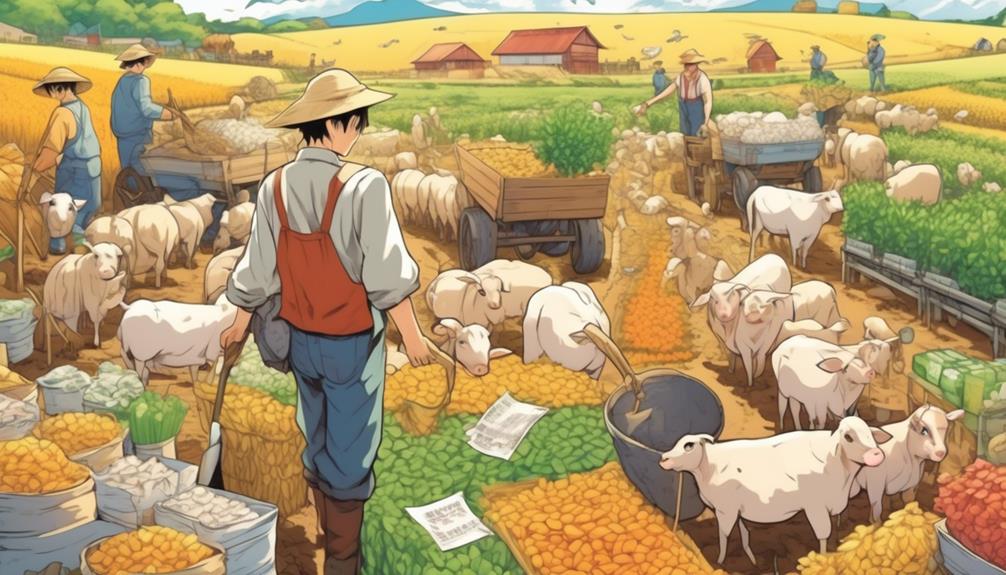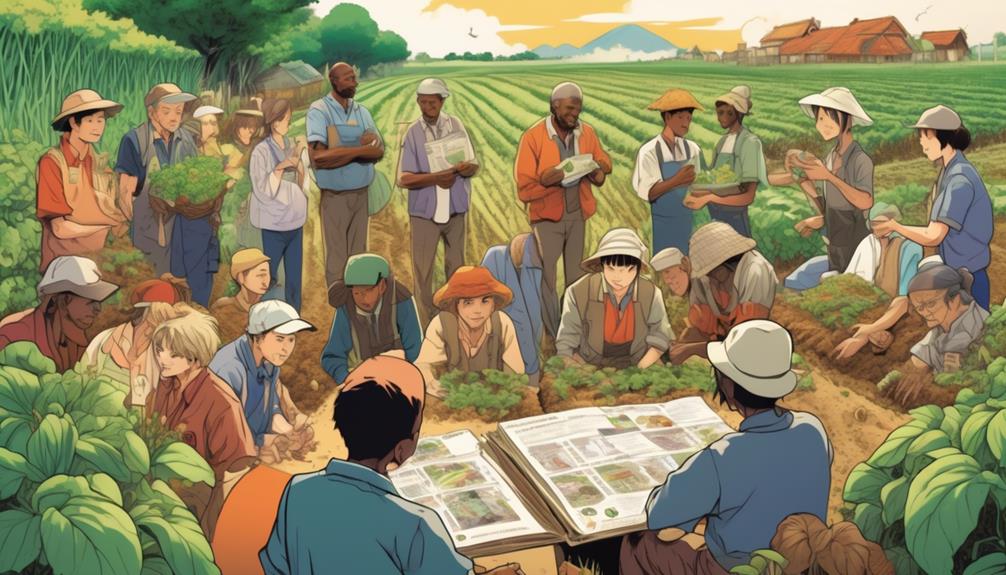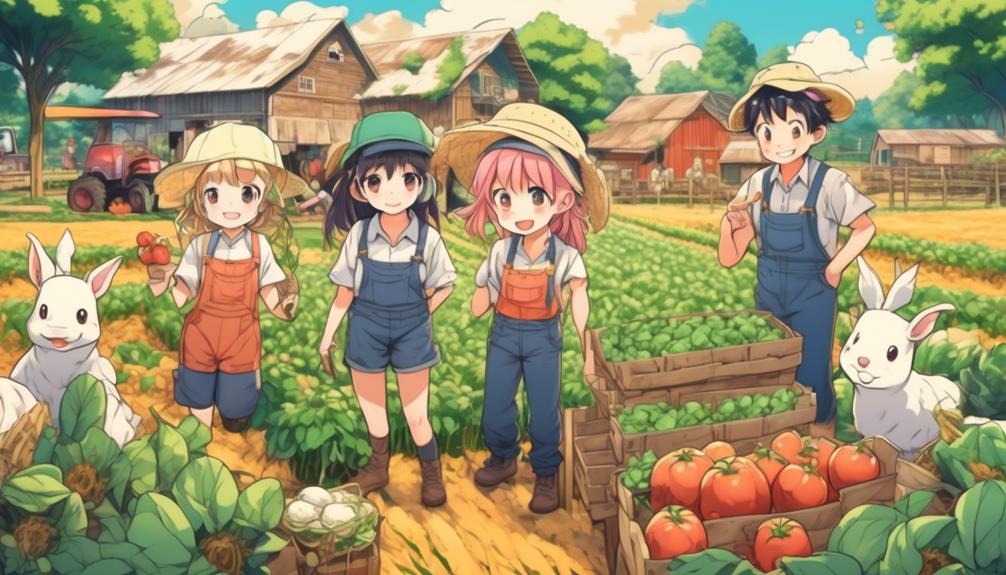In the vast world of agriculture, starting a small farm can seem like a daunting task. Many aspiring farmers may not realize that the key to success lies in more than just acquiring land and planting crops. There are secrets, strategies, and crucial factors that contribute to the thriving of a small farm.
So, what are these secrets? How can one navigate the complexities and challenges of starting a successful small farm? This discussion aims to uncover the hidden gems that can unlock agricultural success, providing valuable insights and practical advice for those who aspire to cultivate their own thriving farm.
Small Farms Tips
- Land ownership is not the first step in starting a farm, and renting land initially can be a more sustainable approach.
- Gaining farming experience before starting a farm is valuable, and resources like YouTube, farm courses, and books can supplement experience.
- Separating family and farming expenses is essential for effective farm budgeting.
- Finding farming jobs and networking with farmers can provide valuable experience and job prospects in the desired region or climate.
Starting a Farm
When starting a farm, it’s important to approach land ownership and the business aspect with a strategic mindset. Land ownership challenges can pose significant hurdles to the success of a farm.
Many aspiring farmers may find themselves undercapitalized due to the high cost of purchasing land. This can lead to stress and hinder the growth of the business.
However, it’s crucial to treat farming as a business from the start.
Instead of immediately buying land, renting land initially and expanding later can be a more sustainable approach. By developing a business plan, creating a startup budget, and raising capital, farmers can navigate the challenges of land ownership and ensure the long-term viability of their farm business.
Gaining Farming Experience

Gaining farming experience is a valuable step towards starting a successful farm, as it provides the necessary skills and knowledge to navigate the challenges of agricultural production.
One way to begin gaining experience is by starting small scale food production in your own backyard. This allows you to learn the basics of growing your own food and caring for plants or animals.
Additionally, there are online farming courses available that allow you to learn the fundamentals of farming from the comfort of your own home. These courses can provide you with valuable information on topics such as soil health, crop rotation, and pest management.
Small Farm Budgeting

To successfully manage the finances of a small farm, it’s crucial to separate personal and farming expenses and create a comprehensive budget. Estimating expenses and tracking income are essential components of farm budgeting.
When starting a small farm, it can be tempting to intertwine family and farming expenses, but this can make it difficult to determine if the farm is making enough to survive. By separating these expenses, farmers can get a clear picture of their financial situation and make informed decisions.
It’s also important to rough estimate monthly expenses to avoid undershooting them.
Developing a farm budget, which requires spreadsheet skills, is necessary to keep track of income and expenses and ensure the farm’s financial success.
Farming Jobs & Networking

Finding farming jobs and networking is essential for individuals looking to gain valuable experience and make local connections in the agricultural industry.
One great way to find farming jobs is by connecting with local farmers on social media platforms. By following local market gardeners and farmers, individuals can stay updated on job opportunities and connect with others in the industry.
Networking at farmers’ markets is also a valuable strategy. Engaging with growers and striking up conversations can lead to job prospects and valuable connections.
It’s important to remember that paid positions are ideal for gaining experience, as working for farmers who can afford to pay provides a more stable and reliable learning opportunity.
Additional Resources & Support

As individuals actively seek out farming jobs and make valuable connections within the agricultural industry, it’s crucial to explore additional resources and support that can enhance their knowledge and understanding.
One such resource that proves to be helpful is The Living Soil Handbook, which provides valuable insights and practical knowledge for aspiring farmers.
This comprehensive guide covers topics such as soil health, composting techniques, crop rotation, and pest management. By delving into the pages of this handbook, farmers can gain a deeper understanding of the importance of soil health and how it contributes to the success of their crops.
In addition to resources like The Living Soil Handbook, community engagement plays a crucial role in supporting local farmers.
Engaging with other farmers, participating in farmers’ markets, and supporting local agricultural organizations not only fosters a sense of belonging within the farming community but also provides opportunities for networking, knowledge exchange, and shared experiences.
Through community engagement, farmers can access valuable support, advice, and resources that can contribute to their success in the agricultural industry.
Mapping Out Your Farm’s Success

Developing a solid business plan is the key to mapping out your farm’s success and ensuring a thriving agricultural venture.
A well-crafted business plan serves as a roadmap, outlining your goals, strategies, and financial projections. It provides a clear direction for your farm and helps you make informed decisions.
When developing a business plan, it’s important to consider your marketing strategies. How will you reach your target audience and promote your products? Understanding your market and competition will help you position your farm for success.
Additionally, financial projections are crucial for planning your budget and estimating your revenue and expenses. This will help you determine the profitability of your farm and ensure its long-term sustainability.
Funding Your Farming Venture

After mapping out your farm’s success with a solid business plan, the next crucial step is creating a startup budget and raising capital to fund your farming venture.
One option to explore is crowdfunding, where you can reach out to a community of supporters who can contribute financially to your farm. Crowdfunding platforms like Kickstarter or Indiegogo can help you showcase your farm’s mission and attract potential investors.
Additionally, seeking grants for agricultural projects is another avenue to consider. There are various grants available from government agencies, non-profit organizations, and foundations that specifically support agricultural initiatives.
Researching and applying for these grants can provide a significant boost to your funding efforts. Remember to thoroughly research the requirements and deadlines for each grant opportunity to maximize your chances of success.
Finding Land & Farm Collaborations

Collaborating with other farms and finding suitable land are key strategies for expanding a small farm sustainably. Farm collaborations, also known as cooperative farming, offer numerous benefits that resonate with aspiring farmers:
- Shared Knowledge and Resources: Collaborating with other farmers allows for the exchange of valuable knowledge and experience. It creates a supportive community where farmers can learn from each other, share resources, and access specialized equipment or tools.
- Increased Marketing Power: By working together, farms can combine their products and marketing efforts, creating a stronger presence in the market. This collaborative approach enhances visibility and attracts more customers, ultimately boosting sales and profitability for all involved.
- Improved Sustainability: Farm collaborations often emphasize sustainable practices, such as organic farming or regenerative agriculture. By pooling resources and knowledge, farmers can implement environmentally friendly techniques, reduce waste, and prioritize the health of the land.
Finding land, especially suitable land for farming, can be a challenge. However, aspiring farmers can explore various avenues to secure land access:
- Leasing or Renting: Renting land initially allows farmers to start their operations without the financial burden of purchasing land. It provides an opportunity to test the viability of the farm before committing to long-term ownership.
- Land Trusts: Land trusts are organizations that acquire and hold land for ecological or agricultural purposes. Collaborating with land trusts can provide farmers with access to affordable land and ensure its long-term protection for future generations.
- Land Sharing: Landowners who aren’t actively using their land may be open to sharing it with aspiring farmers. Through land sharing agreements, farmers can access land while providing benefits to the landowner, such as maintenance or a share of the farm’s produce.
Small Farm Success
Unlocking the secrets to starting a thriving small farm requires a strategic approach and a business mindset. By treating farming as a business, renting land initially, and gradually expanding, aspiring farmers can avoid financial burdens and set themselves up for success.
Gaining hands-on experience, networking with industry professionals, and utilizing available resources are also essential for enhancing farming knowledge and skills.
With careful planning and dedication, aspiring farmers can unlock the potential of their small farm and achieve agricultural success.

